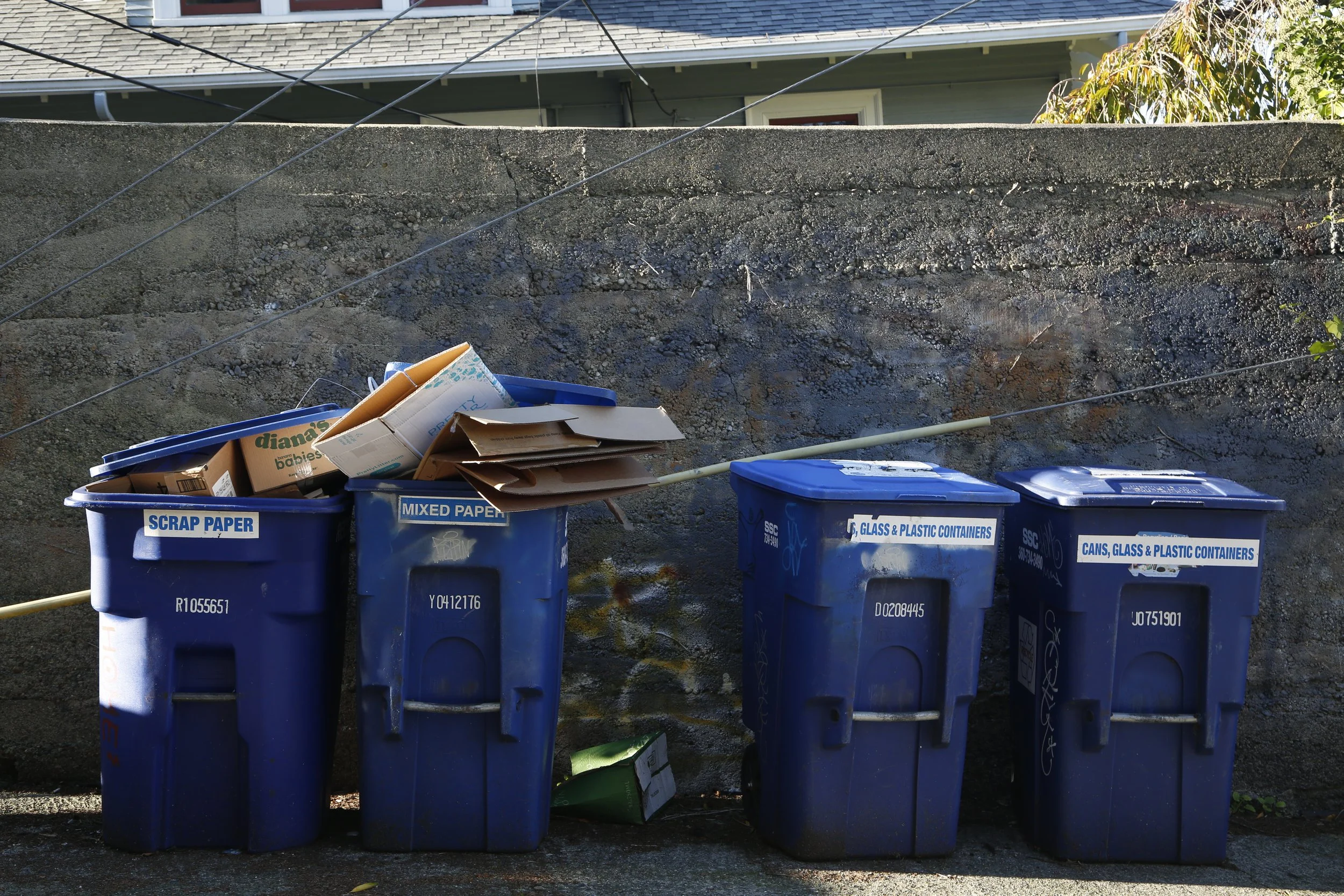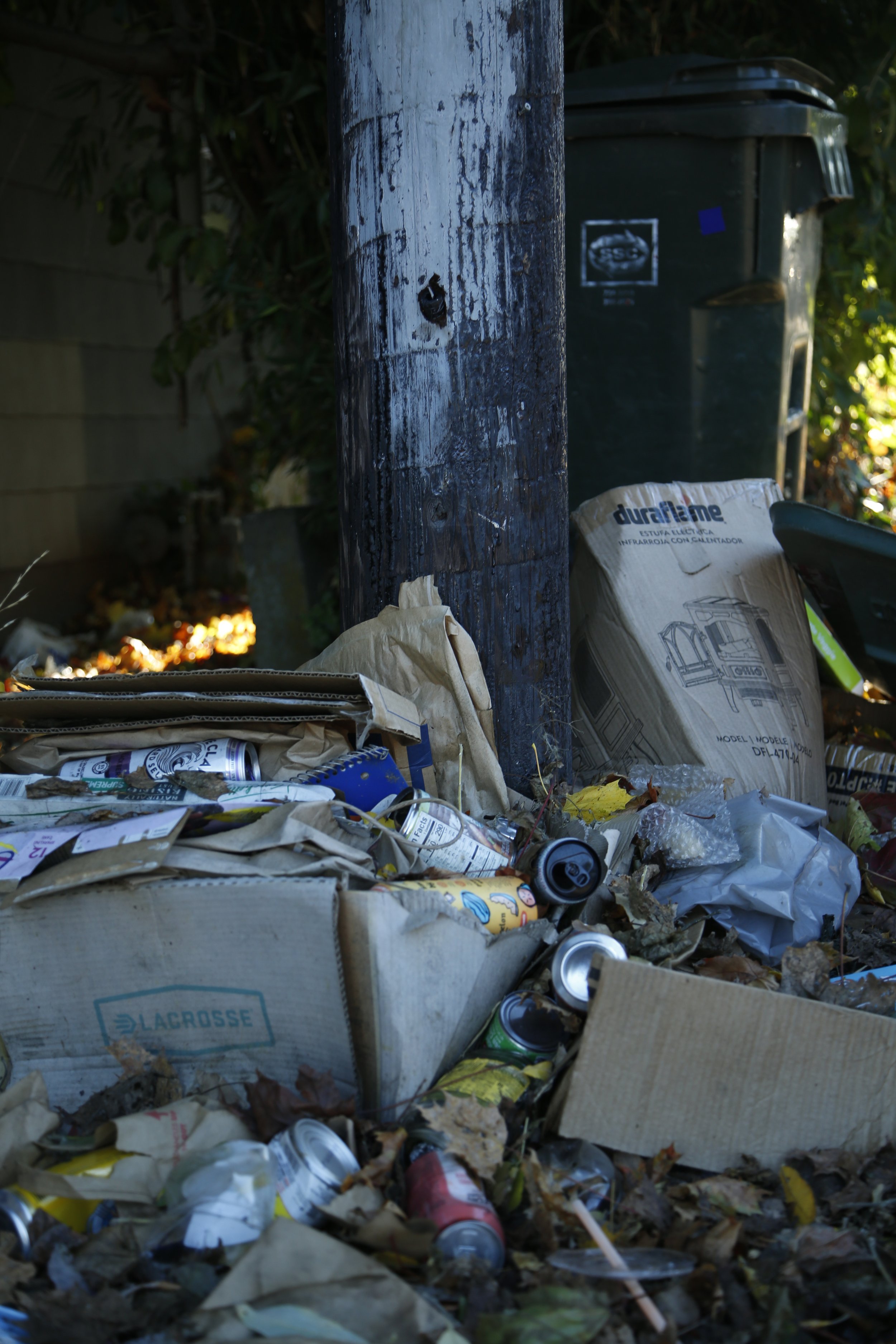Single-Stream Recycling Won’t Fix Upstream Issues
The city of Bellingham will transition to single-stream recycling to combat rising recycling costs. With both affordability and environmental concerns involved in the decision, some city residents wonder if a solution can be found further up the production line.
A line of four colored recycling bins on North Garden St. in Bellingham. These bins will be switched out with single-stream recycling due to the increasing cost of recycling. // Photo by Emily Davis
Story by Tori Lehman || Photos by Emily Davis
December 5, 2023
Say goodbye to the colored bins lining Bellingham’s neighborhood streets. Bellingham city council approved the switch to single-stream recycling for all single family homes due to ever-increasing costs and chronic understaffing of recycling facilities. While the change will come at no cost to residents, the environment may pay the price, leaving citizens looking further upstream to stop the tide of trash.
Currently, Bellingham uses source separated recycling, where residents are responsible for separating their own trash into paper, plastics and landfill. After this change, which currently has no official start date, residents will have one 90 gallon bin where all recyclables will go for collection.
The simplicity of single-stream collection can encourage more people to recycle, but causes more contamination among recyclables. Half-empty soda cans leak onto cardboard, and broken glass sprinkles onto plastics, mixing with one another and leaving them worth less than their cleaner, uncontaminated counterparts.
Another factor driving the switch to single-stream is the increased pressure on American recycling facilities. China, once the largest importer of American waste, is no longer accepting most waste imports due to concerns over pollution and environmental damage. While we still export our waste to other countries like Malaysia and Vietnam, they don’t accept nearly as much as China did. Now, all that waste must be processed here in the States.
While concerns for the environmental impacts of this change rise, another fear grows: do the benefits of any kind of recycling outweigh the costs?
The thundering sounds of garbage trucks are easily recognizable as they meander down alleyways and roadsides. The truck chugs along, then shuts down as it comes to a stop in front of a cozy home. Bins are collected and dumped into the back of the truck before it rumbles to life again. Exhaust pours out from the tailpipe with each turn of the engine.
These trucks make hundreds of stops a day. At each house, workers manually dump every bin.
“That is pretty labor intensive, that kind of separation,” Steven Berry said, a former Sanitary Service garbage truck driver.
Berry estimates that over his 26 years of trash collection, he’s lifted the weight of an aircraft carrier into his truck for disposal.
Cans and boxes soaked from rain and leaves on North Garden St. The ruined material cannot be recycled and will all be sent to the landfill. Single-stream recycling can help increase participation but could lead to recyclables not being recycled if ruined. // Photo by Emily Davis
Single-stream recycling would eliminate this hard labor and simplify the collection process, allowing workers to stay inside the truck and use an automated arm to pick up bins.
“It loads really fast, you watch them go down the street with the side arm,” Steve Berry said, noting that these trucks could take up to 25 tons of garbage. “But as far as the quality, that’s another question.”
Despite the benefits to workers and increased overall recycling by residents, single-stream recycling has a weakness when compared to source separated. Although close to 21% more material enters the recycling process with single-stream, the amount that can actually be repurposed drops by 12%, according to a 2002 Eureka Recycling study. Contamination is to blame.
“The goal is to keep our recyclables in really good shape, because they are right now with the three bin system, and we want to maintain that,” Jennifer Hayden, the solid waste supervisor at Whatcom County Health and Community Services, said.
The decision to switch to single-stream comes not from an environmental standpoint, but a financial one. As the burden of funding recycling programs falls on cities and towns, the environmental impacts are sidelined to prioritize affordability.
Washington State House Representative Liz Berry is one person hoping to ease that burden.
“My bill is going to have the producers funding the collection system in your community, so every single doorstep that has garbage pickup is going to have free recycling pickup,” Representative Berry said.
This bill is based on previous House Bill legislation called extended producer responsibility (EPR), which requires producers to be involved in the waste management of their products.
Not only would producers financially support recycling programs throughout Washington state, but it would also require producers’ products to contain at least 30% recycled material.
This bill will make more items recyclable, as well as make recycling easier for consumers and standardize recycling requirements across Washington state.
Europe and Canada have already experienced the positive impacts of EPR bills. Laws in France were found to be a powerful way to create well-defined waste policies without spending a lot of money, according to a report from The Organization for Economic Co-operation and Development.
Responsibility should not be on the individual to streamline the recycling system. A larger duty falls on corporations to step in and take ownership, according Senator Joe Nguyễn, a co-sponsor of the Washington Recycling and Packaging Act, the companion Senate bill to the House Bill Representative Berry is redesigning.
“I’m less worried about an individual’s carbon footprint than I am about corporations’ carbon footprints, because they really have the ability to dictate what happens for us,” Nguyễn said.
As Bellingham looks to transition to single stream recycling, government officials and citizens alike continue to work towards a recycling system that benefits the community both financially and environmentally.
“We’re just getting the tip of the iceberg on this,” Representative Berry said. “We have to have less packaging waste, and we have to make sure the packing waste we do produce is being responsibly recycled.”
Source separated recycling into red and blue bins on North Garden St. in Bellingham, WA. Currently, all recycling is source-separated, but soon recycling will move to single-stream collection. // Photo by Emily Davis
Tori Lehman is a second year student at Western using journalism to bridge the gap between the environment and those who live in it.
Emily Davis is a senior visual journalism student using multimedia to inspire and educate people about the diverse ecosystems around us.



